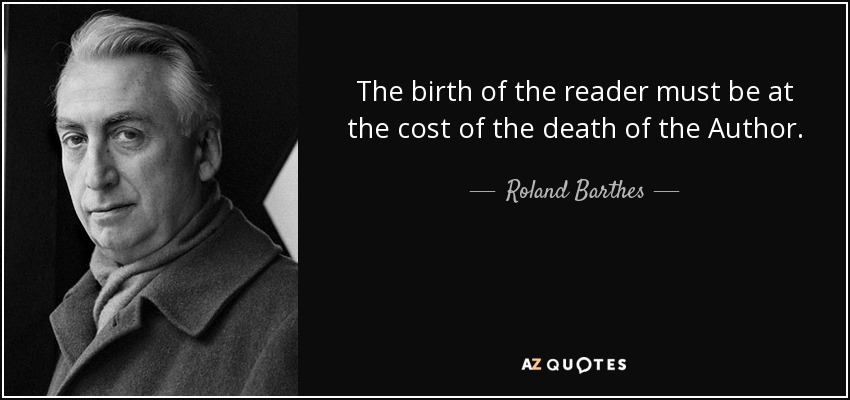Roland Barthes, the famous French literary critic, rose to prominence in the 1960's with his famous treatises including Mythologies (1957), The Elements of Semiology (1964), Image-Music-Text" (1977) and "S/Z" (1970). The Death of the Author (1968) is the most significant piece of essay which in fact laid the foundation for poststructualism.
Roland Barthes's essay is an attack on academic criticism's typical focus on "The Man and his work". The essay begins with an example taken from Balzac's novella, Sarrasina. Balzac's work tells the story of a sculptor, who falls in love with an Italian diva, who is subsequently revealed to be not woman but a castrato. Barthes focuses only on a sentence in the text. What makes a sentence interesting is that it cannot be attributed to the conscious intentions of the author, the narrator or any other characters in the novel. Writing, he boldly asserts, is ‘the destruction of every voice’. Indeed, our obsession with ‘the author’ is a curiously modern phenomenon (some critics still practice), which can be traced back to the Renaissance in particular. Much literary criticism, Barthes points out, is still hung up on this idea of the author as an individual who created a particular work. But this search for a definite origin or source of the literary text is a wild goose chase, as far as Barthes is concerned.
Barthes points out that, in literature, traditionally, a great deal of importance has been assigned to the person that is the author, his life, his tastes and passion. The same has been the case of literary criticism, where, for the most part, the explanation of a work is sought in the person who produced it. The influence of the author remains powerful even today. But in recent times some critics have attempted to challenge the supremacy the author. For instance, the French symbolist poet, Stephane Mallarme, asserted that it is language which speaks to us, rather than the author. The author should write with a certain impersonality: writing is done by suppressing the author’s personality in order to let the work be written.
Mallarme emphasized that it is language that speaks through a text and not the author. This is true of the very act of writing, which he looks upon as an impersonal sphere, where only language acts and performs. Mallarme's arguments were supported by another famous symbolist, Paul Valery. Later, Marcel Proust by adapting the stream of consciousness technique also objected to the importance that was ascribed to the person of the author. Modern linguistics too views the author as a mere instance of writing.
The removal of the author utterly transforms the modern text. The readers are encouraged to read the text in such a way that, at all its levels, the author is absent. The 'author' is always conceived of as the past of his own book, that is, the book and the author stand at diametrically opposed, extreme ends of a temporal line, which is divided into a before and after. The author is viewed as a source of his text; he is thought to nourish the book.
According to Barthes, language is a multidimensional space in which a variety of writings blends and clash. And none of these writings are original. The text, Barthes claims, is 'a substance of quotations drawn from the innumerable centres of culture. The writer has power only to mix writings i.e. reproduce writings and represent them even when the writer attempts to express himself. He is at his best only 'translating' an already formed dictionary. It aims at 'meaning: but this objective is lost because meaning is infinitely deferred (postponed). Hence a text is not to be looked upon as conveying a single 'theological meaning' or the 'message of the author-god.
The text, as already stated, is made up of multiple writings drawn from many cultures. Within the text, these multiple writings enter into mutual relations of dialogue. However, this multiplicity is focused at one point. Barthes substantiates his arguments on the basis of an observation made by J.P.Vernant on Greek classical tragedy. The language in Greek classical text is peculiar in that it is woven from words with double meanings. Hence each character understands it differently. This perpetual misunderstanding is one of the key factors which precipitate Greek tragedy. There is however, one person who understands each word in its duplicity. He, in fact, hears the deafness of the characters who interact in the play and this person is the reader/ listener. Hence the reader is the point where the multiplicity of the text gets focused and not the author.
Barthes points out that classical criticism never paid any attention to the reader. It only recognized the authenticity of the author. When the author was 'found', the text was believed to be 'explained'.
Through his controversial essay The Death of the Author, Roland Barthes argues in favour of the reader. He stresses the need to overthrow the myth regarding the author. Barthes concludes the essay with the statement that "the birth of the reader must be at the cost of the death of the author."
Barthes states that readers are free to open and close the signifying process of the text without respect for the signified.

No comments:
Post a Comment
looking forward your feedbacks in the comment box.